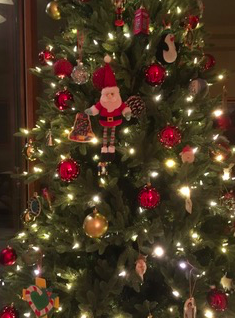Keeping the magic of Santa alive
Most people can remember believing in Santa Claus when they were younger, believing that if they were good all year, they would receive the presents they asked for on Christmas Day. Santa Claus gave us something to look forward to all year long. Years ago, before Christmas, I would write my “letter to Santa” in hopes that he would bring me whatever Barbie I wanted. I can remember the many Christmases my little sister and I would dash to the Christmas tree and see what Santa Claus had brought us. The immediate days after would be full of spending hours with those gifts and excitedly waiting for the day a year later when the cycle would begin again. However, around fourth grade, most kids begin to question the reality of Santa.
Parents begin their Christmas shopping for their kids usually around Black Friday and stop around Christmas Eve. If they shop online, they have to be careful that they hide the deliveries away before their children figure it out. This is all for a good reason too, because we all anticipate, even as teenagers, for new things and dream about what we want. To be honest, every year I look in my mom’s Amazon cart to see what she has potentially gotten me.
Xavier theater teacher Mrs. Corderman has a young daughter who is beginning to doubt the existence of Santa. “When my daughter first came to me and asked me if Santa was real, I directed her toward her older brother. He had come to me years before with the same question, and he told her to do some research. As of today, she still believes in Santa Claus,” she says.
Another alternative to escape later questioning is choosing not to tell one’s children about Santa. For example, Xavier biology teacher Mrs. Weiland opted to share the truth about Santa instead of telling her children a white lie. Some of my friends’ siblings just realized that Santa is a fantasy used to spread the joy of gift-giving, and were quite disappointed with their parents for not being honest with them. I remember when I told my parents that I knew Santa was fake, they were the ones who seemed a little disappointed. They said that they did not want to watch me grow up just yet.
However, the true meaning behind Santa Claus reaches further than just receiving gifts. It is about giving selflessly trying to make someone happy. Santa may be a fictitious character conceived by children’s parents, but Santa also stands for kindness and sharing during a season packed full of materialism and extravagance. Santa is used as a spirit of giving for children to look up to and they will one day pass on the tradition of Santa to their own children.




